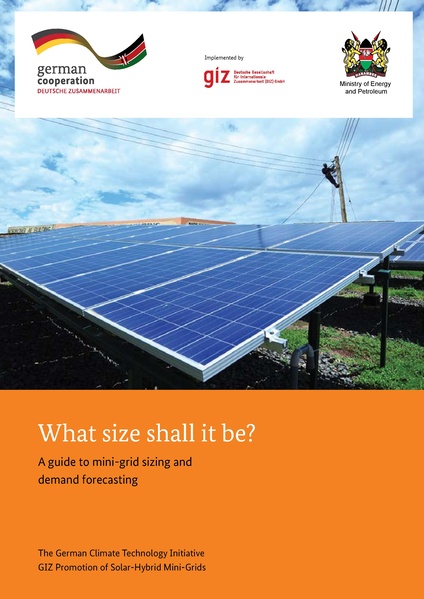File:Mini-Grid Sizing Guidebook.pdf
 Size of this JPG preview of this PDF file: 424 × 599 pixels. Other resolution: 170 × 240 pixels. |
Original file (2,007 × 2,834 pixels, file size: 0 bytes, MIME type: application/pdf, 68 pages)
Summary
=
| Description |
English: Guidebook on load assessment and system sizing of mini-grids
|
|---|---|
| Source |
GIZ ProSolar |
| Date |
2016-09-06 |
| Author |
Dr. Philipp Blechinger (RLI), Elisa Papadis (RLI), Martin Baart (Ecoligo), Pierre Telep (GIZ), Florian Simonsen (GIZ) |
| Permission |
See license tag below. |
Presentation of the report =
This report called ‘Mini-grid sizing guidebook’ aims to provide a quick understanding on electricity demand assessment and system sizing for mini-grids, which are planned to be implemented in urban areas with no access to electricity (also known as ‘greenfield’ sites).
A mini-grid is a set of small-scale electricity generators and possibly energy storage systems interconnected to a distribution network that supplies electricity to limited number of customers. The combination of photovoltaic (PV) systems with a diesel genset and/or storage system is a flexible and usually least-cost solution for rural communities. Thus, this technology is able to tap the solar energy potential, to provide rapid, cost-effective and high quality electrification, and to allow a profit investment on renewable energy sources.
In sub-Saharan Africa ‘greenfield’ sites represent the larger share in terms of rural electrification opportunities. Thereby, while fostering an effective implementation of a PV-diesel-battery-hybrid mini-grid power plant, this guidebook will also contribute to the ultimate goal of enhancing rural electrification in sub-Saharan Africa.
This guidebook, is divided into four chapters. Chapter 1 gives a basic introduction and overview about sizing mini-grids. Chapter 2 describes the sizing procedure for mini-grids, including a description of required data and information. The methods for the assessment of energy demand are explained in detail, and the correction of the assessed demand to the effective demand is discussed. Furthermore, forecasting energy demand and recommendations on system sizing are addressed. Chapter 3 gives an overview of existing system sizing tools, focusing on the mini-grid builder and HOMER (Hybrid optimization of multiple energy resources). Chapter 4 entails a conclusion and some final recommendations to users of the tools and handbook.
Licensing
|
File history
Click on a date/time to view the file as it appeared at that time.
| Date/Time | Thumbnail | Dimensions | User | Comment | |
|---|---|---|---|---|---|
| current | 11:37, 6 September 2016 |  | 2,007 × 2,834, 68 pages (0 bytes) | ***** (***** | *****) | User created page with UploadWizard |
You cannot overwrite this file.
File usage
The following 2 pages use this file:





















